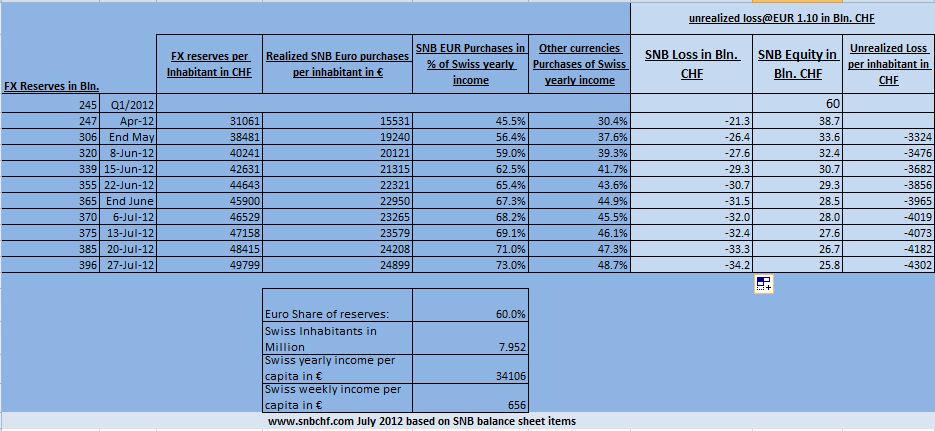With the SNB results today it became clear that the Swiss National Bank has invested 77% of the huge 125 billion CHF rise in currency reserves during the second quarter into Euros. The dependency on the euro has become that big, so that the Swiss might be obliged to join the euro zone if they want to avoid big losses.
Our spreadsheet shows that the SNB implicitly forces each Swiss to invest 73% of his/her personal income for 2012 into euros, no matter if the person is employed, a pensioner or an infant. Other currencies take 48.7% of the yearly income, a total of nearly 112% of the yearly income per capita. This figure was still in April a lot lower, namely 76% and in May 94%. The SNB currently obliges each Swiss to buy every week an average of 600 euros and 400 euros in other currencies, this compared with an weekly salary per capita of 656 EUR. Essentially the central bank forces each inhabitant to give her a loan financed with an overdraft in the people’s personal account. The spreadsheet shows additionally how each week the FX reserves per inhabitant increased from 31000 francs in April to 49799 francs in September 2012, and how the potential SNB loss rose from 21 bln. CHF to 34 bln. in September.
SNB losses when the peg breaks
If the EUR/CHF peg is broken and the pair falls to 1.10 and all other currencies (USD, JPY, GBP, etc.) behave similarly (i.e. lose 8.6%), then the central bank must realize a loss of 34.2 billion Swiss Francs. The SNB equity would reduce from 60 bln. CHF in Q1/2012 (or 66 bln. CHF in Q2/2012) to 25.8 billion francs.
If, however, the EUR/CHF falls to parity (and other currencies with the same percentage), then the SNB would have negative equity of 7 billion CHF, having lost 67 billion francs, about 10% of the Swiss GDP.
The back-fall scenario: Swiss to join the euro zone
One might think that the only way-out is that Switzerland jumps into the saving arms of the euro zone. With the increase of the euro share of the SNB reserves things seem to be clear. A rise of the euro against the franc is for us only possible when the Southern European economies see stronger GDP increases than the Swiss one, for us an impossibility for at least 15 years.
We know that Thomas Jordan suggested in the 1999 that Switzerland should neither peg to nor join the euro zone because of a potential inflation risk for Switzerland. We will show in the coming week in detail why this risk is currently not the biggest one for the Swiss if they join the euro; but another risk is far more dangerous than inflation, the risk is called “Target2”.
See more for


















